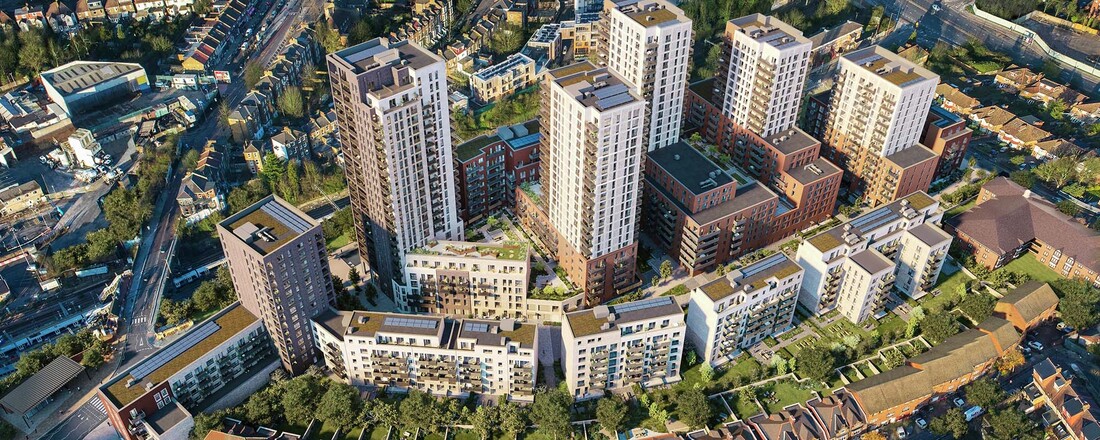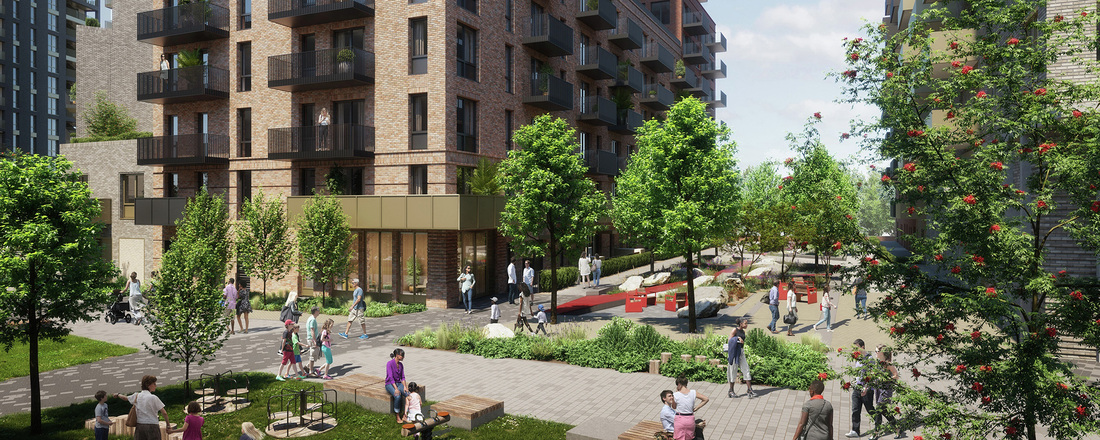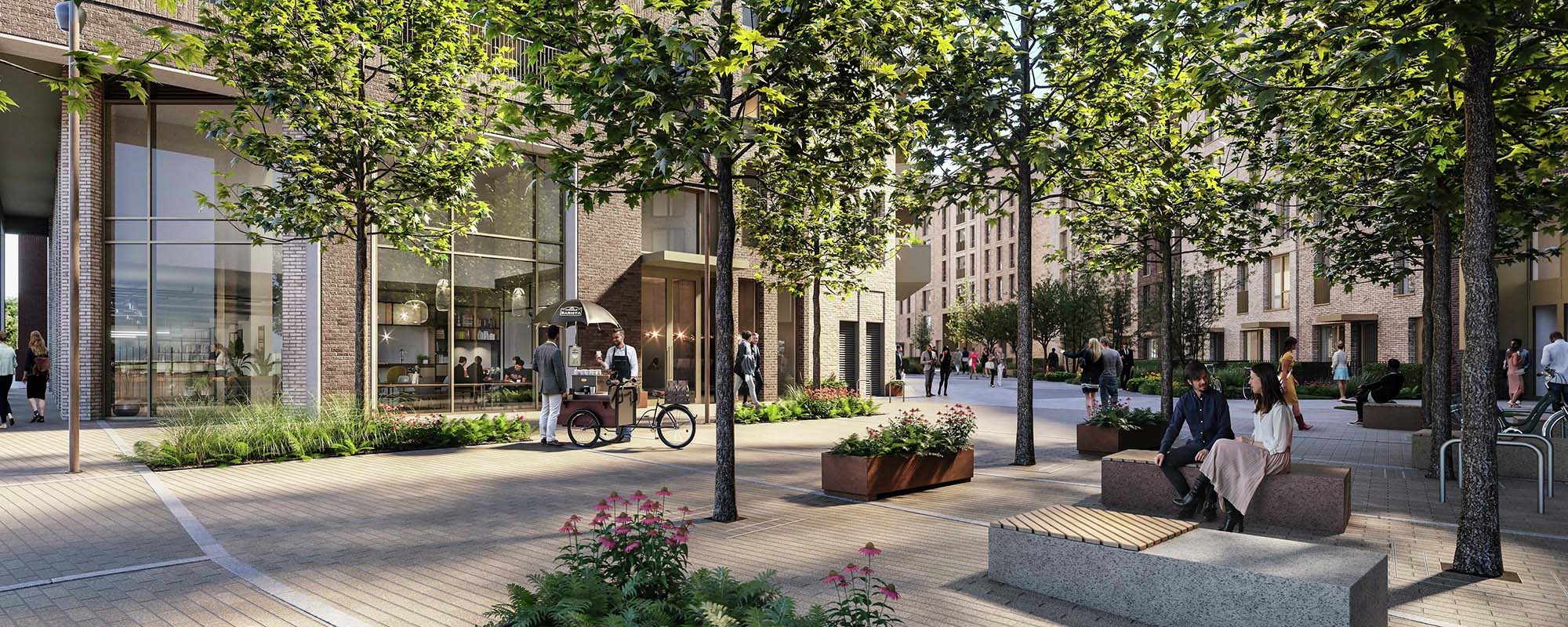Get updates from The Developer straight to your inbox Yes, please!
Mount Anvil: “The cost-of-living issue is fundamental to our sustainability strategy”
Listening to residents is informing change at Mount Anvil, including the pressing need to address the energy-cost crisis and their approach community engagement itself. In conversation with Marcus Bate, Partnerships and Communities Director

The desire to make residents happy comes up a lot in my interview with Marcus Bate, Partnerships and Communities Director at Mount Anvil for The Developer Podcast. He sees community engagement as critical to meeting that goal. From kids testing out playgrounds to long chats over a cuppa, Bate considers feedback a universal good. “Our number one driver is to get more people to give feedback.”
“We were pretty unusual in saying that we thought the Mayor of London’s introduction of mandatory ballot requirements for estate transformation was brilliant. Unless residents vote in majority in favour of redeveloping their estate, you don’t do it. We think that’s the simplest and best way of making sure the right schemes come forward.”
“It’s their lives we’re hoping to transform, not ours,” says Bate. “You need to know this is what they want, it’s not imposed on them.”
Council estate regeneration is the nexus of Mount Anvil’s residential work, but it wasn’t always that way, having increased when their main funding partner became the Mayor of London. The partnership, described as the first of its kind between GLA Land and Property and a private developer when announced in 2020, saw Mayor of London Sadiq Khan approve a £50m loan facility for Mount Anvil to accelerate construction of its 2,000-home pipeline.
As part of the GLA agreement, a greater proportion of the homes they develop must be affordable – mostly social rent with some shared ownership – which are designed and developed by Mount Anvil, then sold to housing association partners. Mount Anvil are also expected to hit key targets on equality and diversity, and must meet key principles such as never building separate entrances or segregated facilities for social and private tenants.
Mount Anvil “recommitted to focusing exclusively on the London market” in 2021, after being hit by a “perfect storm” of problems at Capital&Centric’s Kampus development in Manchester, which was its sole project outside the capital. Mount Anvil typically works in joint venture partnerships with housing associations, buying the land, developing, building and marketing the properties. Because they do everything, Bate says they work on a relatively small number of projects at one time – just six to eight schemes.
“We work with a housing association and then they buy all the affordable housing. They tell us what they think they need – and the most pressing need is social rented housing… We would say with a lot of pride that social housing is growing as a proportion of what we build.”
While Bate understands why many social value metrics rely on financial proxies for happiness and investment: “I also think it sucks”
The balance of the residential is traditional build-to-sell – Mount Anvil doesn’t do build-to-rent or help-to-buy. “We haven’t done any. We just don’t do any.”
The move into estate regeneration also represents a move into placemaking for Mount Anvil, and the experience of Covid coupled with their emphasis on resident-engagement has led to a shift in their approach to the use of their ground-floor spaces and the design of green spaces.
“What we rapidly observed was residents saying, ‘my immediate locality is more important’” says Bate. “People felt more enthusiastic about spending time with their neighbours… of using green spaces as sociable spaces.”
At the Friary Park Estate in Acton, now rebranded as The Verdean, the clamour for communal spaces and services has seen the creation of a hub – with a communal kitchen, potting shed, residents’ lounge and cycle hub – that serves all tenures, both social and private.
“It’s the new neighbourhood,” says Bate. “That’s the biggest transformation.” Other post-Covid changes at The Verdean include the ground-floor office space reimagined as a maker-space and artist studios, while the residents’ desire to shop locally has made them reconsider the retail offering, where “the affordability of products is a key decision criteria.”
Plans for the redevelopment of Friary Park Estate were hit by vocal opposition in 2021, when the height of the redevelopment sparked the formation of opposition group Cap the Towers which objected to plans to increase the height of the residential towers – the group has since declared a partial ’victory’ in its campaign, which included action to save Friars Place Green as common land. Ealing Council has since announced it will be increasing its scrutiny of high rise buildings.
A fresh planning application for The Verdean development was submitted in April which would supersede the 2020 planning permission, and is pending consideration by Ealing. The revised application increases the provision of total homes from 990 to 1,228 by increasing the footprint and massing of four blocks, and increasing the height of one block to between 12 to 17 storeys. Cap the Towers has announced it is examining the 368 documents in the planning application and will oppose any further increases in height. The new planning application designates 37% of the overall total number of homes as affordable: 773 private-sale homes, 237 social rent homes, 70 London Affordable Rent and 148 London Shared Ownership intermediate tenure homes.
Mount Anvil’s response to the opposition campaign has been to underline resident support. Bate says listening to residents has led to a lot of changes – the new submission includes new resident and community facilities – and adds that their approach to engagement has rapidly evolved since the Covid lockdowns, which increased the value of face-to-face conversations.
Mount Anvil uses HappyOrNot for community engagement – the company responsible for those ubiquitous happy-face pads in airports and toilets
“Covid, in forcing us to rely on digital, has shown us some of the flaws in our digital strategy. Those in-person conversations are a very different experience. We were getting less people turning up to drop-ins virtually than when we were doing them physically. And some older people were less willing, or less able to, even participate digitally.”
As a result, Bate says they now opt for a rich mix of outreach tools: “A knock on the door, coffee in the lounge, newsletters on paper, translated into a relevant language and handed out, as well as all the digital platforms.”
As for measuring sentiment, Mount Anvil takes a different approach than some of its competitors. While Bate understands why many social value metrics rely on financial proxies for happiness and investment: “I also think it sucks”.
“We focus on feelings first,” says Bate. “That’s our metric…. We concluded that feelings matter first.”
Uniquely, they work with HappyOrNot – the company responsible for those ubiquitous happy-face pads in airports and toilets, with four green, pink and red buttons featuring four different emoticons – big smile, little smile, little frown and big frown.
“We focus on feelings first,” says Bate. “That’s our metric…. feelings matter first”
“Those terminals and that four-point system is at the heart of how we evaluate resident sentiment at any event. How did you find the event itself? Slap the pad. And how do you feel about the development itself?”
“We don’t need pound equivalents, because we are measuring change over time,” says Bate. The importance is making it simple and fun to gather feedback.
With the rise in energy bills, community feedback is now informing Mount Anvil’s ambition to “use good design to improve the financial standing of residents by reducing the increase in housing costs.”
“The cost-of-living issue is pretty fundamental to where our sustainability strategy as a business has gone,” says Bate.
The developer is looking at how they can insulate and make design changes to reduce energy use – and energy bills – as well as running workshops to support residents in using less energy.
The big prize is “reducing energy use in a way that marries social and environmental benefit.”
“Reducing energy use is important in terms of the environment and hits the wallets of the residents we work with – it’s a win-win,” adds Bate.
Subscribe to The Developer Podcast wherever you get your podcasts, and sign up to The Developer Weekly email to find out when new episodes go live. You can support our podcast on Patreon at www.patreon.com/thedeveloperuk
If you love what we do, support us
Ask your organisation to become a member, buy tickets to our events or support us on Patreon
Sign up to our newsletter
Get updates from The Developer straight to your inbox
Thanks to our organisation members
© Festival of Place - Tweak Ltd., 124 City Road, London, EC1V 2NX. Tel: 020 3326 7238



